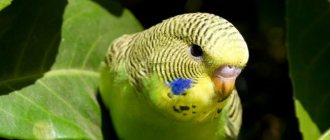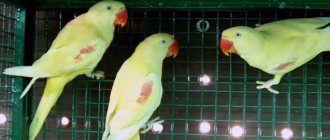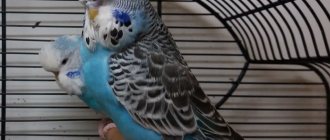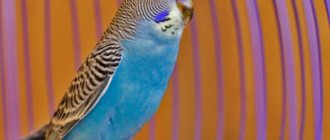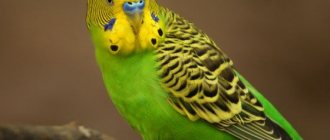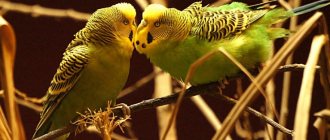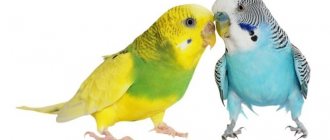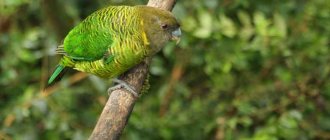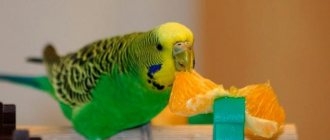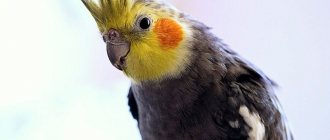average life expectancy
The quality of life of a bird directly affects how many years budgerigars live. On average, representatives of this family live from 4 to 8 years.
In the wild, birds roam across the continent, covering considerable distances in search of food and suitable housing.
Diseases, injuries and natural disasters can reduce life expectancy several times.
Disease outbreaks occur most often in large flocks. Young individuals whose immune systems have not yet fully developed are especially susceptible to disease. Real epidemics often occur, killing thousands of birds.
Do you have a parrot?
Not really
At home
Unlike other domesticated animals, budgies feel much more comfortable in an apartment or private house. Here they have stable nutrition, care, and a favorable microclimate.
In domestic and favorable conditions, a bird can live for about 8-10 years. If a pet receives all the necessary vitamins, minerals and occasionally encounters stressful situations, then it may well live up to 15 years.
The gender of a budgerigar does not play any significant role in terms of life expectancy. Receiving the same food and being in similar climatic conditions, males and females age at the same rate.
In wild nature
The birthplace of budgerigars is Australia. The bird lives in the southwestern and northeastern parts of the continent. They live in large colonies, but move in small groups of several dozen individuals each.
The Australian climate is quite unpredictable: small rivers can dry up and trees can rot due to the abundance of floods. Therefore, parrots are forced to wander around the mainland in search of a better place to live.
On their travels, they meet carnivorous birds and wild animals that are not averse to feasting on cute birds.
It is a rare parrot that survives to its old age. Most often, he becomes the prey of predators or dies from another infectious outbreak. In the wild, parrots can live up to 5 years. Individuals who have reached 8 years of age are the exception and great luck rather than the rule.
It is also useful to read: Top 10 best foods for budgies
How many years can a budgie live at home?
No less relevant is the question of how many years wavy animals live at home. The lifespan is determined by the type of bird. The average life expectancy of birds kept at home is 10-15 years. Under ideally created conditions of existence, this period can be extended to 20 years. Moreover, life expectancy does not depend on factors such as gender. The main thing is that the inhabitant of the apartment or house does not suffer from any diseases.
We recommend reading: How budgerigars see the world around them
What affects life expectancy
Here a lot depends on the pet owner. If a person has provided the bird with all the necessary conditions for a comfortable life and protected it from stress, then it will delight him for many years. Otherwise, the parrot will repeat taking into account its wild brother. Let's consider all the factors that both directly and indirectly affect the life expectancy of a budgerigar.
Cell
The birdcage must be spacious. In cramped conditions, parrots begin to experience stress and, as a result, get sick.
The feeder and drinker must be positioned in such a way as to prevent contact of food and water with excrement. The optimal place for a cage is the sunny side of a house or apartment, where there are no drafts.
Housing for a pet should not be located near heating devices or household appliances that emit strong heat.
You need to clean the cage at least once a week. The abundance of feathers, fluff, and at the same time dirt is a favorable environment for the development of harmful microorganisms. If the bird starts sneezing, then this is a sure sign to start cleaning.
Health
This factor directly affects the life expectancy of the pet. It is necessary to regularly check poultry for the presence of parasitic pests and diseases. Healthy individuals are characterized by increased activity. During the day, they show interest in what is happening around them, rather than sitting sleepy in the corner of the cage.
If the parrot has stopped singing, communicating with members of the household, or has suspicious growths on its body, then this is a reason to contact a veterinarian. Poor appetite and excessively tearful eyes also indicate a pet’s painful condition.
Stress
Budgerigars need to be protected from psychological shocks. If, in addition to the bird, there are other pets in the house that show increased interest in exotic birds, then such situations must be stopped. What saves you from a curious cat is the high location of the cage (cabinets, mezzanines, pendants, etc.), where the parrot will feel safer.
Another strong source of stress is household appliances. A nearby TV or washing machine can seriously frighten your pet. If the bird is in the kitchen, then under no circumstances should you place the cage on a constantly vibrating refrigerator or next to the stove.
Communication
Under natural conditions, parrots live in colonies and have no shortage of society. But in the apartment the pet begins to feel sad due to lack of attention. to him , put him in your arms so that he doesn’t feel lonely.
A mirror in the cage will partly brighten up your pet's loneliness. It should approximately correspond to the dimensions of the bird, thereby creating the effect of the presence of a fellow bird. Toys, such as bells or bright beads, also come in handy.
Nutrition
The main diet of budgies is millet. There is plenty of it in specialized food.
It is very important to dilute the diet with fruits and vegetables: small pieces of apples or carrots. During the molting period, it is necessary to add protein elements to the food, as well as chalk.
In its natural environment, the bird feeds on sesame, hemp seeds, sunflower seeds and meadow grasses.
The favorite treat of budgies is small grass grains. They swallow them whole, after which they are partially digested in the crop and then sent to the stomach.
The presence of any foreign particles of dirt in food is unacceptable. The bird's esophagus is finicky, and sharp or large pieces can injure it. The food must be fresh. Even a gram of mold can cause severe poisoning.
The average individual consumes about 1 tablespoon of a specialized mixture per day. During the period of growing up and reproduction, the dose is increased by 1.5-2 times. Vitamins should be treated with extreme caution. Parrots need groups A and D, but their excess leads to prolonged illnesses and sometimes to the death of the pet.
Birds should not be overfed : excess food is worse than hunger. Obesity is very difficult to treat, and the digestive system can ultimately be ruined. It is better to slightly underfeed the animal than to overfeed it.
It is also useful to read: How to germinate oats for a parrot
How long will budgerigars live in captivity?
To a large extent, the attitude of the owner determines how many years budgerigars live at home. Tamed birds can live very freely in an apartment. It would seem that their freedom is limited by the space of the cage and occasional flights around the rooms. But the little creature feels great under the protection of humans, when it does not need to worry about food and shelter every day. If you give your feathered baby attention and take care of all the little things, the lifespan of a budgerigar at home can be increased to 8 years or more.
The most common causes of bird death
In the wild, budgies have plenty of enemies. In the process of evolution, birds have learned to fight them and avoid most dangers, but still many do not survive. The bulk of the deaths were among young and aged individuals. The former have no experience, and the latter have the strength.
Drought
Lack of water is a serious threat to the budgerigar population. Birds have adapted to the drought in part by collecting dew from vegetation and exploring crevices in caves for moisture. But the last one is still not enough for everyone.
Predators
Natural enemies of budgies are carnivorous birds and representatives of the cat family. Predators destroy the nests of birds, attack young animals and eat the weak. There are frequent clashes between parrots and starlings, to whom they most often lose, being left without food and a warm place.
Human
Farmers are engaged in the extermination of birds and budgerigars, among others. Birds cause serious damage to crops and crops. Beautiful and at the same time valuable animals are caught for sale. At the same time, not the most humane methods of capture are used, where some of the birds die.
Conditions of detention
At home, incorrectly selected food or additives can cause the death of a pet. Too low or, on the contrary, high temperature in the room also reduces the life expectancy of the parrot. This also includes cats, dogs and snakes living in the neighborhood.
At home
The life expectancy of budgerigars at home is much higher and averages 7-8 years. This is due to objective reasons, since birds do not need:
- Run away from predators.
- Take care of constant food and drink, since all this is given to them by their owners.
Owners help birds in breeding. All this greatly simplifies the life of budgerigars and increases its lifespan.
But 8 years is far from the limit for a budgie at home. Some birds live up to 20 years. This is due to the very good care they take from their owners.
Average life expectancy of budgerigars at home
What can I say, in captivity, under the caring supervision of people, the lifespan of these amazing creatures is much longer than that of their relatives living in the wild. Pets that are tamed to live in a comfortable apartment or comfortable house are not afraid of any falcons or hawks, they do not need to fight with starlings. In addition, they are not tormented by thirst, hunger and heat. Pets require care. And, naturally, the owner must create favorable conditions for his bird to live: feed it well, water it, and let it fly freely around the house. Otherwise the parrot will not last long. After all, this largely determines how many years your budgie will live at home (in a cage).
How long do budgies live in the wild?
In their natural habitat (namely, Australia), these birds live a relatively short time. Typically, their lifespan in such conditions is from 4 to 6 years . Sometimes a parrot can live longer - up to 8-10 years in the wild, but this is rather an exception to the rule. Unfortunately, in the wild, a lot of budgerigars simply die. Why does this happen? There are several reasons:
- starlings fight with budgies for territory (interestingly, the former were brought to the mainland by humans);
- they are hunted by predatory animals and birds;
- sometimes they have to fly vast distances to find food and water;
- parrots cannot always find food for themselves, sometimes they have to starve;
- dry seasons and rainy seasons also negatively affect the life expectancy of birds;
- people set traps in their gardens and fields;
- Some reservoirs have contaminated water.
The good news is that budgies have very good immunity and they repopulate within a short period of time.
